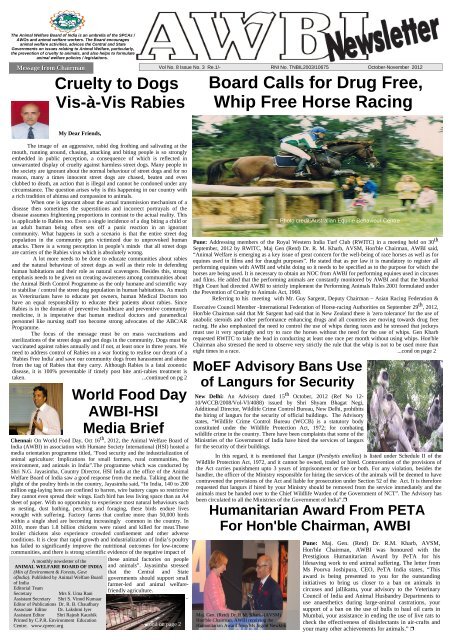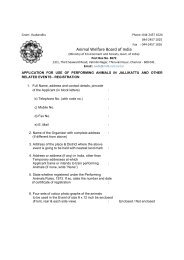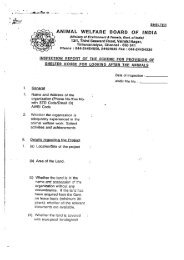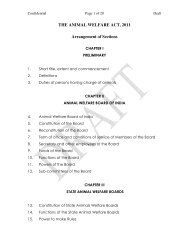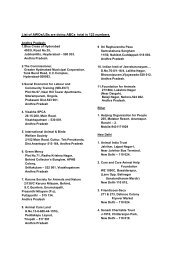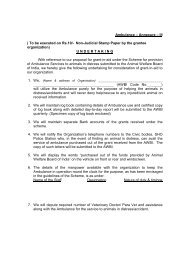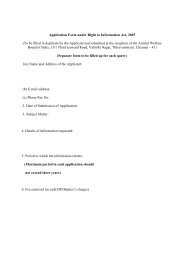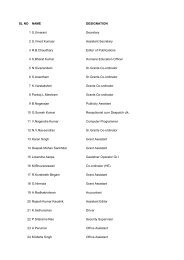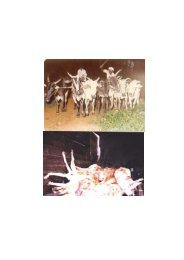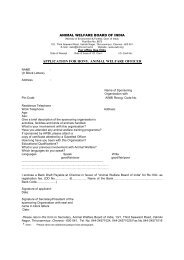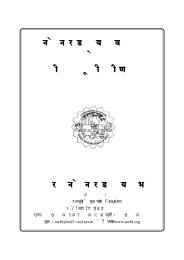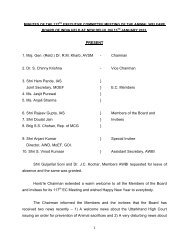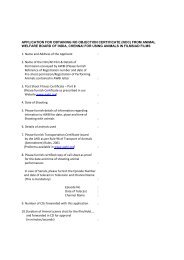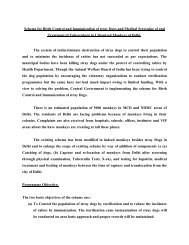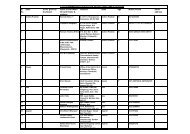October-November 2012 Newsletter - Animal Welfare Board of India
October-November 2012 Newsletter - Animal Welfare Board of India
October-November 2012 Newsletter - Animal Welfare Board of India
- No tags were found...
Create successful ePaper yourself
Turn your PDF publications into a flip-book with our unique Google optimized e-Paper software.
The <strong>Animal</strong> <strong>Welfare</strong> <strong>Board</strong> <strong>of</strong> <strong>India</strong> is an umbrella <strong>of</strong> the SPCAs /AWOs and animal welfare workers. The <strong>Board</strong> encouragesanimal welfare activities, advices the Central and StateGovernments on issues relating to <strong>Animal</strong> <strong>Welfare</strong>, particularly,the prevention <strong>of</strong> cruelty to animals, and also helps to formulateanimal welfare policies / legislations.Message from ChairmanCruelty to DogsVis-à-Vis RabiesVol No. 8 Issue No. 3 Re.1/- RNI No. TNBIL2003/10675 <strong>October</strong>-<strong>November</strong> <strong>2012</strong><strong>Board</strong> Calls for Drug Free,Whip Free Horse RacingMy Dear Friends,The image <strong>of</strong> an aggressive, rabid dog frothing and salivating at themouth, running around, chasing, attacking and biting people is so stronglyembedded in public perception, a consequence <strong>of</strong> which is reflected inunwarranted display <strong>of</strong> cruelty against harmless street dogs. Many people inthe society are ignorant about the normal behaviour <strong>of</strong> street dogs and for noreason, many a times innocent street dogs are chased, beaten and evenclubbed to death, an action that is illegal and cannot be condoned under anycircumstance. The question arises why is this happening in our country witha rich tradition <strong>of</strong> ahimsa and compassion to animals.When one is ignorant about the actual transmission mechanism <strong>of</strong> adisease then sometimes the superstitions and incorrect portrayals <strong>of</strong> thedisease assumes frightening proportions in contrast to the actual reality. Thisis applicable to Rabies too. Even a single incidence <strong>of</strong> a dog biting a child oran adult human being <strong>of</strong>ten sets <strong>of</strong>f a panic reaction in an ignorantcommunity. What happens in such a scenario is that the entire street dogpopulation in the community gets victimized due to unprovoked humanattacks. There is a wrong perception in people’s minds that all street dogsare carriers <strong>of</strong> the Rabies virus which is absolutely wrong.A lot more needs to be done to educate communities about rabiesand the natural behaviour <strong>of</strong> street dogs as well as their role in defendinghuman habitations and their role as natural scavengers. Besides this, strongemphasis needs to be given on creating awareness among communities aboutthe <strong>Animal</strong> Birth Control Programme as the only humane and scientific wayto stabilise / control the street dog population in human habitations. As muchas Veterinarians have to educate pet owners, human Medical Doctors toohave an equal responsibility to educate their patients about rabies. SinceRabies is in the domain <strong>of</strong> preventive healthcare and preventive communitymedicine, it is imperative that human medical doctors and paramedicalpersonnel like nursing staff too become strong advocates <strong>of</strong> the ABC/ARProgramme.The focus <strong>of</strong> the message must be on mass vaccinations andsterilizations <strong>of</strong> the street dogs and pet dogs in the community. Dogs must bevaccinated against rabies annually and if not, at least once in three years. Weneed to address control <strong>of</strong> Rabies on a war footing to realise our dream <strong>of</strong> a'Rabies Free <strong>India</strong>' and save our community dogs from harassment and abusefrom the tag <strong>of</strong> Rabies that they carry. Although Rabies is a fatal zoonoticdisease, it is 100% preventable if timely post bite anti-rabies treatment istaken. ...continued on pg 2A monthly newsletter <strong>of</strong> theANIMAL WELFARE BOARD OF INDIA(Min <strong>of</strong> Environment & Forests, Govt<strong>of</strong><strong>India</strong>). Published by <strong>Animal</strong> <strong>Welfare</strong> <strong>Board</strong><strong>of</strong> <strong>India</strong>Editorial TeamSecretaryMrs S. Uma RaniAssistant Secretary Shri S. Vinod KumaarEditor <strong>of</strong> Publications Dr. R. B. ChaudharyAssociate Editor Dr. Lakshmi IyerAssistant Editor Shri Rajesh KaushikPrinted by C.P.R. Environment EducationCentre. www.cpreec.orgWorld Food DayAWBI-HSIMedia BriefChennai: On World Food Day, Oct 16 th , <strong>2012</strong>, the <strong>Animal</strong> <strong>Welfare</strong> <strong>Board</strong> <strong>of</strong><strong>India</strong> (AWBI) in association with Humane Society International (HSI) hosted amedia orientation programme titled, "Food security and the industrialization <strong>of</strong>animal agriculture: Implications for small farmers, rural communities, theenvironment, and animals in <strong>India</strong>”.The programme which was conducted byShri N.G. Jayasimha, Country Director, HSI <strong>India</strong> at the <strong>of</strong>fice <strong>of</strong> the <strong>Animal</strong><strong>Welfare</strong> <strong>Board</strong> <strong>of</strong> <strong>India</strong> saw a good response from the media. Talking about theplight <strong>of</strong> the poultry birds in the country, Jayasimha said, “In <strong>India</strong>, 140 to 200million egg-laying hens are confined to barren, wire battery cages so restrictivethey cannot even spread their wings. Each bird has less living space than an A4sheet <strong>of</strong> paper. With no opportunity to experience most natural behaviours suchas nesting, dust bathing, perching and foraging, these birds endure liveswrought with suffering. Factory farms that confine more than 50,000 birdswithin a single shed are becoming increasingly common in the country. In2010, more than 1.8 billion chickens were raised and killed for meat.Thesebroiler chickens also experience crowded confinement and other adverseconditions. It is clear that rapid growth and industrialization <strong>of</strong> <strong>India</strong>’s poultryhas failed to significantly improve the nutritional outcomes for low-incomecommunities, and there is strong scientific evidence <strong>of</strong> the negative impact <strong>of</strong>these animal factories on peopleand animals”. Jayasimha stressedthat the Central and Stategovernments should support smallfarmer-led and animal welfarefriendlyagriculture.....cond on page 2Pune: Addressing members <strong>of</strong> the Royal Western <strong>India</strong> Turf Club (RWITC) in a meeting held on 30 thSeptember, <strong>2012</strong> by RWITC, Maj Gen (Retd) Dr. R. M. Kharb, AVSM, Hon'ble Chairman, AWBI said,“<strong>Animal</strong> <strong>Welfare</strong> is emerging as a key issue <strong>of</strong> great concern for the well-being <strong>of</strong> race horses as well as forequines used in films and for draught purposes”. He stated that as per law it is mandatory to register allperforming equines with AWBI and whilst doing so it needs to be specified as to the purpose for which thehorses are being used. It is necessary to obtain an NOC from AWBI for performing equines used in circusesand films. He added that the performing animals are constantly monitored by AWBI and that the MumbaiHigh Court had directed AWBI to strictly implement the Performing <strong>Animal</strong>s Rules 2001 formulated underthe Prevention <strong>of</strong> Cruelty to <strong>Animal</strong>s Act, 1960.Referring to his meeting with Mr. Guy Sargent, Deputy Chairman – Asian Racing Federation &Executive Council Member -International Federation <strong>of</strong> Horse-racing Authorities on September 29 th , <strong>2012</strong>,Hon'ble Chairman said that Mr Sargent had said that in New Zealand there is 'zero tolerance' for the use <strong>of</strong>anabolic steroids and other performance enhancing drugs and all countries are moving towards drug freeracing. He also emphasized the need to control the use <strong>of</strong> whips during races and he stressed that jockeysmust use it very sparingly and try to race the horses without the need for the use <strong>of</strong> whips. Gen Kharbrequested RWITC to take the lead in conducting at least one race per month without using whips. Hon'bleChairman also stressed the need to observe very strictly the rule that the whip is not to be used more thaneight times in a race. ...cond on page 2MoEF Advisory Bans Use<strong>of</strong> Langurs for SecurityNew Delhi: An Advisory dated 15 th <strong>October</strong>, <strong>2012</strong> (Ref No 12-10/WCCB/2008/Vol-VI/4088) issued by Shri Shyam Bhagat Negi,Additional Director, Wildlife Crime Control Bureau, New Delhi, prohibitsthe hiring <strong>of</strong> langurs for the security <strong>of</strong> <strong>of</strong>ficial buildings. The Advisorystates, “Wildlife Crime Control Bureau (WCCB) is a statutory bodyconstituted under the Wildlife Protection Act, 1972; for combatingwildlife crime in the country. There have been complaints that some <strong>of</strong> theMinistries <strong>of</strong> the Government <strong>of</strong> <strong>India</strong> have hired the services <strong>of</strong> langursfor the security <strong>of</strong> their buildings.In this regard, it is mentioned that Langur (Presbytis entellus) is listed under Schedule II <strong>of</strong> theWildlife Protection Act, 1972, and it cannot be owned, traded or hired. Contravention <strong>of</strong> the provisions <strong>of</strong>the Act carries punishment upto 3 years <strong>of</strong> imprisonment or fine or both. For any violation, besides thehandler, the <strong>of</strong>ficer <strong>of</strong> the Ministry responsible for hiring the services <strong>of</strong> the animals will be deemed to havecontravened the provisions <strong>of</strong> the Act and liable for prosecution under Section 52 <strong>of</strong> the Act. It is thereforerequested that langurs if hired by your Ministry should be removed from the service immediately and theanimals must be handed over to the Chief Wildlife Warden <strong>of</strong> the Government <strong>of</strong> NCT”. The Advisory hasbeen circulated to all the Ministries <strong>of</strong> the Government <strong>of</strong> <strong>India</strong>”.Humanitarian Award From PETAFor Hon'ble Chairman, AWBIMaj. Gen. (Retd) Dr. R.M. Kharb, (AVSM)Hon'ble Chairman, AWBI receiving theHumanitarian Award from Ms Ingrid NewkirkPhoto credit:Australian Equine Behaviour CentrePune: Maj. Gen. (Retd) Dr. R.M. Kharb, AVSM,Hon'ble Chairman, AWBI was honoured with thePrestigious Humanitarian Award by PeTA for hislifesaving work to end animal suffering. The letter fromMs Poorva Joshipura, CEO, PeTA <strong>India</strong> states, “Thisaward is being presented to you for the outstandinginitiatives to bring us closer to a ban on animals incircuses and jallikattu, your advisory to the VeterinaryCouncil <strong>of</strong> <strong>India</strong> and <strong>Animal</strong> Husbandry Departments touse anaesthetics during large-animal castrations, yoursupport <strong>of</strong> a ban on the use <strong>of</strong> bulls to haul oil carts inMumbai, your assistance in ending the use <strong>of</strong> live rats tocheck the effectiveness <strong>of</strong> disinfectants in air-crafts andyour many other achievements for animals.”
Cruelty to Dogs Vis-à-Vis RabiesMany a times there is delay in getting post-exposuretreatment which can have serious consequences. The time lapse mayrange from a few hours to a few days and even several weeks. If perchance that biting dog was actually rabid, then the virus would havegot plenty <strong>of</strong> time to multiply and travel along the nerves with thetypical symptoms <strong>of</strong> rabies developing in such individuals within afew weeks to a few months. Let me emphasize that the treatment <strong>of</strong>post-bite prophylaxis falls under the domain <strong>of</strong> emergency medicineand should be handled with the same swiftness and care that isprovided to an accident victim. What I wish to emphasize is that evenif a person has been bitten by a rabid dog and takes immediate postbitevaccination on day 0, day 3, day 7, day 14 and day 28 along withrabies immunoglobulin serum around the bite wound (if requireddepending on category / seriousness <strong>of</strong> the bite), the affected personcan be fully protected from rabies.The following guidelines issued by the World HealthOrganization on “Rabies for Pre and Post-exposure Prophylaxis inHumans” must be followed by medical doctors for the treatment <strong>of</strong>human patients bitten by dogs:They must invest more in the rural supply chain – allowing poorfarmers practicing more humane and sustainable free-range egg andchicken production to capture a greater share <strong>of</strong> the market for eggsand meat.” Speaking about the terrible suffering that the unproductivecattle sent for slaughter undergo, he said, “There is also nothing holyabout the way cattle are treated in the country. The animals undergoimmense suffering as they are transported long distances for slaughter.There are no shades, no water nor ramps for the animals and they aretied to each other, some die along the way, while some are beaten upand suffer injuries. The worst is yet to come, at the slaughter houses,the animals are killed in full view <strong>of</strong> each other. Besides,companies have pushed out small players out <strong>of</strong> the market. This hasresulted in reduction <strong>of</strong> employment opportunities and damage tonatural resources such as water bodies and forests. With large andconcentrated emission <strong>of</strong> gases such as methane, it has also resulted inclimate change.” <strong>Animal</strong> <strong>Welfare</strong> <strong>Board</strong> <strong>of</strong> <strong>India</strong>, Chennai, ViceChairman Dr. S Chinny Krishna said, “<strong>India</strong> has the finest lawspertaining to animal welfare, but the problem has always been theenforcement.”Project VetTrain in JaipurlargeWound Treatment: should be immediate and must befollowed even if the person presents long after exposure and mustconsist <strong>of</strong>:immediate washing and flushing for 15 minutes with soap and water,or water alone, and disinfection with ethanol (700ml/l) or iodine(tincture or aqueous solution).Vaccination and administration <strong>of</strong> rabies immunoglobulinRabies Vaccine (intra-dermal or intra-venous) and immunoglobulintherapy (if required) must be instituted as soon as possible,If rabies immunoglobulin is not available on the first visit, its usecan be delayed by a maximum <strong>of</strong> 7 days from the date <strong>of</strong> the firstpost-bite anti-rabies vaccine injection,Initiation <strong>of</strong> Post-exposure Prophylaxis (PEP) should not await theresults <strong>of</strong> laboratory diagnosis or be delayed by time spent inobservation <strong>of</strong> the dog when rabies is suspected,Pregnancy and infancy are never contra-indications to PEP”.For more details, the ppt is available for free download at thewebsite <strong>of</strong> the World Health Organization atwww.who.int/rabies/PEP_prophylaxis_guidelines_June10.ppdf. Toknow more about rabies in humans as well as in animals, please seethe WHO link at http://www.who.int/rabies/en/. Complete details areavailable on all aspects <strong>of</strong> the disease. I would like to add that the<strong>Animal</strong> <strong>Welfare</strong> <strong>Board</strong> <strong>of</strong> <strong>India</strong> is facilitating implementation <strong>of</strong> Govt.<strong>of</strong> <strong>India</strong>’s ABC/AR Programme with a view to make <strong>India</strong> a rabiesfree country. It has started to show some results. A few metros such asChennai, Jaipur and Kalimpong have not reported any human Rabiescase in the last few years due to intensive ABC/AR Programmes there.With best wishes,Sd/-Maj. Gen. (Retd) Dr. R. M. Kharb, AVSMChairman, AWBI.email: rmkawbi@yahoo.co.inEttumanoor: The <strong>India</strong>n Veterinary association, Kerala organized a technicalseminar on rabies eradication at Hotel National Park, Ettumanoor on 28-09-<strong>2012</strong>. The function was inaugurated by the Hon’ble Finance Minister Shri KM Mani. Dr Arunkumar, Kerala. State President, IVA presided over thefunction. Dr C Sreekumar, General Secretary, IVA Kerala welcomed all thedelegates that included veterinary surgeons from all 14 districts <strong>of</strong> Kerala.Hon, Minister for Finance Shri K M Mani sanctioned Rs 15 lakhs per annumas risk allowance @ Rs 180/- to veterinary doctors working in the <strong>Animal</strong>Husbandry Departments in response to the memorandum submitted by IVA.Hon'ble Finance Minister, Shri K.M. Mani stressed on the need for all civicbodies to adopt humane dog population control measures through the highlyeffective ABC-AR Programmes. At the technical session Dr Ilona Otter,Clinical Director, Worldwide Veterinary Services gave a very informative talkon the ABC-AR Training Programmes conducted by Worldwide VeterinaryServices and also gave very good answers and solutions to the questions posedby the delegates.Jaipur: Vets Beyond Borders launched its first Project Vet-Train two week Training Course in ABC Surgery incollaboration with Humane Society International at the Veterinary Training Centre in Jaipur on 17 th September<strong>2012</strong>. Present at the inaugural function were Dr. Jack Reece, Veterinary Director, Help in Suffering, Jaipur and Dr.Sunil Chawla, Veterinary Training Director, Humane Society International, Asia. The Training Programme wasattended by nine veterinarians and four veterinary assistants. Participants in the course came from Surat,Ahmedabad, Department <strong>of</strong> <strong>Animal</strong> Husbandry, Gurdaspur, Punjab and Panchkula, Haryana, NGOs from Delhiand Jaipur, Rajasthan and also fresh graduates from the Apollo Veterinary College, Rajasthan.Says Dr Sonia Chawan, Project Manager, Project Vet-Train, “I am happy to say that all <strong>of</strong> the Trainees followedthe course schedule <strong>of</strong> 14 days to get maximum theoretical and practical knowledge”. During the TrainingProgramme, Senior Veterinarian, Dr. Jack Reece gave a lecture to the trainees on ‘Veterinary Ethics and Role <strong>of</strong>Veterinarians in <strong>Animal</strong> <strong>Welfare</strong>’. He supervised the surgeries and shared his immense experience and knowledgewith the participants about the ABC-AR projects. Dr. Sunil Chawla, Veterinary Training Director, Humane SocietyInternational, Asia and Dr. Soniya Chawan, Project Manager, Vets Beyond Borders, VetTrain, <strong>India</strong> conducted thetheoretical lectures and practicals for the Vets while Dr. Ravindra Dhayal conducted the theoretical and practicalsessions for the Veterinary Assistants. A total <strong>of</strong> 194 Surgeries were carried out within 11 days. The trainees wereassessed on the basis <strong>of</strong> Pre-Training assessments, Core Competencies and Post-Training assessments along withthe acquired practical knowledge.On 28th September <strong>2012</strong>, a visit <strong>of</strong> Project VetTrain trainees to “Help in Suffering” was arranged to see thefunctioning <strong>of</strong> an ‘Ideal’ ABC- AR project in Jaipur. The trainees also attended a Conference at RajasthanVeterinary University campus on the occasion <strong>of</strong> ‘World Rabies Day’. All participants in the course were awardedcertificates based on the pre and post-training assessments and core competencies. Says Dr Soniya Chawan, “Mysincere thanks to Humane Society International for joining hands with Vets Beyond Borders to improve andstandardize the quality <strong>of</strong> veterinary services provided by animal welfare groups in <strong>India</strong>”. The inaugural launch <strong>of</strong>the ABC-AR Training Programme in Jaipur will be followed by 13 consecutive courses for Veterinarians,Veterinary Assistants, Programme Managers and Humane <strong>Animal</strong> Handlers until April 2013 . Proceedings <strong>of</strong> the 1st International Conference on Dog Population Control is available for download athttps://secure.fera.defra.gov.uk/dogs<strong>2012</strong>/bookOfAbstracts.cfmWorld Rabies Day Event - IVA Kerala Holds Seminar on RabiesKerala State Finance Minister Shri K.M.Mani lighting the lamp and inaugurating the Seminar on Rabies<strong>Board</strong> Calls for Drug Free, Whip Free Horse Racing...contd from pg 1During the meeting a discussion took place about depriving jockeys' use <strong>of</strong> the whip after the 4 th <strong>of</strong>fence. Hon'ble Chairman, AWBI said that a jockey who has been deprived the use<strong>of</strong> the whip should not be permitted to use the whip during the total period irrespective <strong>of</strong> which racing centre he rides, anywhere in <strong>India</strong>. He added that AWBI is an all-<strong>India</strong> body and thelaw needs to be implemented all over <strong>India</strong> in all Turf Clubs and not only at the Centre where the <strong>of</strong>fence has taken place. Hon'ble Chairman also emphasized the need for applying humanetraining methods for horses, especially with reference to the stalling / loading <strong>of</strong> horses in gates without the use <strong>of</strong> any brutal physical force which would cause physical and mental torture tothe horses before the races. Stating that Mr Shivlal Daga and Mrs Bhaktawar Chenoy have been appointed by the Govt <strong>of</strong> <strong>India</strong> as inspectors, he stressed that they are legally obliged to ensurethat the Performing <strong>Animal</strong>s Rules is strictly adhered to. This was to ensure that the welfare <strong>of</strong> the horses is safeguarded, both during training and during racing. He also requested the TurfClubs to subscribe to the <strong>Board</strong>'s monthly magazine <strong>Animal</strong> Citizen and Jeev Saarthi as well as the <strong>Board</strong>'s <strong>Newsletter</strong> to keep themselves updated about the latest developments in the field <strong>of</strong>animal welfare.Referring to the draft <strong>of</strong> the revised Medication Rules circulated by AWBI and adopted by RWITC, Mr Daga stressed that stricter punishment would be contemplated if the drugsbanned by Parliament and listed in the proposed <strong>Animal</strong> <strong>Welfare</strong> Bill were used. Maj Gen (Retd) Dr. R.M. Kharb (AVSM), Hon'ble Chairman, AWBI requested that the revised rules be put upto the Stewards <strong>of</strong> all Turf Clubs for their consideration and approval without delay. The Additional Secretary, RWITC mentioned that he would do so. The Meeting was attended by MrShivlal Daga and Mrs Bhatawar Chenoy, Inspectors, AWBI, Mr N.H.S. Mani, Addtl Secretary, RWITC Ltd, Mr Wayne J. Wood, Chief Integrity Steward, RWITC, Mr.Pradyumna Singh,Senior Stipendary Steward, RWITC Ltd, Dr. S.K.Kulkarni, Senior Veterinary Officer, RWITC Ltd, Mr Riyaz M. Khan, Stipendary Steward, RWITC Ltd and Dr. M. Rajasekhar, TechnicalDirector, Diagnostic Research Laboratory, Pune.
The Ladakh Anti- Rabies & Dog ManagementProgrammeByDr. Ruth PyeFormer VBB Manager <strong>of</strong> the LARDoM ProgrammeThe AWBI became involved in 2010 when a Memorandum <strong>of</strong>Understanding was written and signed by the AWBI, theAdministration <strong>of</strong> Leh, the <strong>Animal</strong> and Sheep Husbandry Departments<strong>of</strong> Leh, LACS and VBB. The MOU refers to the programme asLARDoM – the Ladakh Anti Rabies and Dog ManagementProgramme. The LARDoM Programme operates from the veterinaryclinic on the LACS site at Saboo Ayu, a village 8 kilometres outside <strong>of</strong>Leh. The surgical season currently runs from June to September andexperienced volunteer veterinarians from overseas work alongside localstaff to surgically desex and vaccinate around 1,000 dogs each season.Injured or sick dogs are also treated, and any dog presenting withCanine Transmissible Venereal Tumour (TVT) is housed and treatedfor as long as 6 weeks with chemotherapy.Special events like the 'Rabies Vaccination Mornings' areheld regularly throughout the season for pet dogs. Thesuccess <strong>of</strong> the programme is becoming more evident eachyear, with a majority <strong>of</strong> dogs in Leh now sporting the earnotch to signify they are desexed and vaccinated. Thelarge number <strong>of</strong> dogs in regional Ladakh requires theprogramme’s expansion in the near future to address theseareas. The Ladakhi street dogs certainly have their share<strong>of</strong> hardships to contend with, not least being the long harshwinters. Many <strong>of</strong> these tough dogs are fine caninespecimens with good intelligence and great stamina. Withtheir thick, furry coats and large frames, friendly andplayful spirit, they are simply amazing! It's been a pleasureand a privilege to be working amongst them in theextraordinarily beautiful landscape <strong>of</strong> Ladakh. AWBI Conducts Humane EducationProgramme at InfosysChennai: Mr Sriram Vepuri, Humane Education Officer, Blue Cross <strong>of</strong> Hyderabad who has initiated the<strong>Board</strong>'s Humane Education Programme in <strong>October</strong> <strong>2012</strong> conducted an animal welfare presentation at theInfosys Office in Chennai on Oct 17 th , <strong>2012</strong>. Feedback from two <strong>of</strong> the participants who attendedSriram's talk shows that the presentation had been effective in sensitizing the audience. After attendingthe talk, Infosys employees Swaroop and Nandita report, “The presentation was certainly an eye-openerfor Infoscions. Sriram presented feasible opportunities for the animal welfare group <strong>of</strong> Infosys on how toapply animal welfare concepts in the corporate world. Clearly the talk was not only focused for theanimal lovers, but also for the generic audience - who on a daily basis encounter issues with animals suchas stray dogs. Thank you, Sriram for bringing to us facts, animal friendly alternatives and an inspirationto start living in harmony with our fellow earthlings!” Ladakh, the “Land <strong>of</strong> High Passes” is a high altitudedesert region <strong>of</strong> Jammu & Kashmir, sandwiched between theHimalayan and Karakorum Mountain ranges. The extremewinters see temperatures dropping to minus 40 o C and theregion’s road access to the outside world can be blocked formany months. Summers on the other hand are a hive <strong>of</strong> activitywith crops <strong>of</strong> barley, apricots and apples being planted, tendedand harvested. Vegetable and flower gardens flourish with theglacial melt water, and tourists arrive in the hundreds fortrekking in the mountains and to experience the thrivingBuddhist culture. Many visitors to the region’s capital <strong>of</strong> Lehnotice the large, furry, healthy-looking dogs that have made thestreets their home.As in many parts <strong>of</strong> <strong>India</strong>, there is an overpopulation <strong>of</strong>street dogs in Ladakh which threatens the health <strong>of</strong> the Ladakhipeople, livestock and wildlife as well as compromises the healthand welfare <strong>of</strong> the dogs themselves. The dog population hasincreased in Ladakh in recent decades with the burgeoningtourist and trekking industry, and the prominent army presence.The multitude <strong>of</strong> hotels and restaurants in Leh provide a goodfood supply for dogs in the summer months, and the army campsare a year round source <strong>of</strong> food. A street dog sterilization andrabies vaccination (ABC-AR) programme was started in 2006 asa collaboration between the Australian NGO Vets BeyondBorders (VBB) and the local NGO Ladakh <strong>Animal</strong> Care Society(LACS). The programme has received funding from the Frenchorganization “Fondation Brigitte Bardot” and the Administration<strong>of</strong> Leh.Dogs <strong>of</strong> Lodhi Garden SavedNew Delhi: On 17th <strong>October</strong>, <strong>2012</strong>, The Delhi High Court withdrew the earlierorder for the removal <strong>of</strong> all Lodhi Garden dogs, and passed a revised order thatstates that: “The Lodhi Garden dogs will NOT be removed. If, however, there isa complaint <strong>of</strong> dog bite, it will be dealt in accordance with The <strong>Animal</strong> BirthControl (Dogs) Rules, and only the biting dog removed for sterilization (ifunsterilized), vaccination (if not vaccinated), and observation”. The petitionersappealed that The <strong>Animal</strong> Birth Control (Dogs) Rules, 2001, passed under thePrevention <strong>of</strong> Cruelty to <strong>Animal</strong>s Act, 1960, does not allow removal <strong>of</strong> dogs.According to the ABC (Dogs) Rules, 2001, dogs can only be sterilized,vaccinated, and then they must be returned back to the very same territory thatthey were picked up from.The revised order was issued based on the application made by twentyapplicants including eleven lawyers. The twenty applicants include, The <strong>Animal</strong><strong>Welfare</strong> <strong>Board</strong> <strong>of</strong> <strong>India</strong>, The Voice <strong>of</strong> Stray Dogs, People For <strong>Animal</strong>s, GreenCircle <strong>of</strong> Delhi, Citizens for the <strong>Welfare</strong> and Protection <strong>of</strong> <strong>Animal</strong>s, PETA <strong>India</strong>,Mrs. Amanda Seth, Mr. Tilak Vir Nanda, Mrs. Veena Balwant, Mr. SaubhikChakrabarty (Associate Editor, Economic Times, in his individual capacity), Mr.Ajay Sud, Mrs. Dhana Korgaokar, Mrs. Neerja Sarin, Mrs. Shobha Malhotra,Mr. Dhritabrata Bhattacharjya, Ms Rupa Sengupta, Mr. Deepak Wadhawan, Mr.Avik Kedia, Mr. Ajay Gupta, and Mr. Kabir Ahmed. Reference: www.strays.in
वोलटमानवमानवउतमVol No. 8 Issue No. 13 Re.1/- RNI No. TNBIL2003/10675 <strong>October</strong> <strong>2012</strong>The <strong>Animal</strong> <strong>Welfare</strong> <strong>Board</strong> <strong>of</strong> <strong>India</strong> is an umbrella <strong>of</strong> the SPCAs/AWOs and<strong>Animal</strong> <strong>Welfare</strong> Workers. The <strong>Board</strong> encourages <strong>Animal</strong> <strong>Welfare</strong> activities,advices the Central and State Governments on issues relating to <strong>Animal</strong><strong>Welfare</strong>, particularly the Prevention <strong>of</strong> Cruelty to <strong>Animal</strong>s, and also helpsto formulate <strong>Animal</strong> <strong>Welfare</strong> Policies / Legislations.PRINTED BOOKRegistered with theRegistrar <strong>of</strong>Newspapers for <strong>India</strong>under No.RNI NoTNBIL2003/10675AWBI NEWSLETTER(Monthly)Official Publication <strong>of</strong> the <strong>Animal</strong> <strong>Welfare</strong> <strong>Board</strong> <strong>of</strong> <strong>India</strong>To____________________________________________________________________________________________________________________________________________________________________________________________________ Cruelty to Dogs Vis-à-Vis Rabies<strong>Board</strong> calls for Drug Free, Whip Free Horse RacingHumanitarian <strong>of</strong> the Year Award from PeTA for Hon'ble Chairman,AWBIAWBI-HSI Media Brief on World Food DayProject Vet-Train in JaipurThe Ladakh Anti-Rabies & Dog Management Programme Dogs <strong>of</strong> Lodhi Garden Saved by Delhi High Court OrderAWBI Conducts Humane Education Programme at InfosysWorld Rabies Day Event - IVA Kerala Holds Seminar on Rabies Monkey savedANIMAL WELFARE BOARD OF INDIA(Ministry <strong>of</strong> Environment & Forests, Govt <strong>of</strong> <strong>India</strong>)13/1, Third Seaward Rd, Valmiki Nagar,Thiruvanmiyur, Chennai – 600 041Tel: 044-24571024/ 044-24571025 Fax: 044- 24571016Email: awbi@md3.vsnl.net.inANIMAL WELFARE BOARD OF INDIA(Ministry <strong>of</strong> Environment & Forests, Govt <strong>of</strong> <strong>India</strong>)13/1, Third Seaward Rd, Valmiki Nagar,Thiruvanmiyur, Chennai – 600 041Tel: 044-24571024/ 044-24571025 Fax: 044- 24571016Email: awbi@md3.vsnl.net.in


